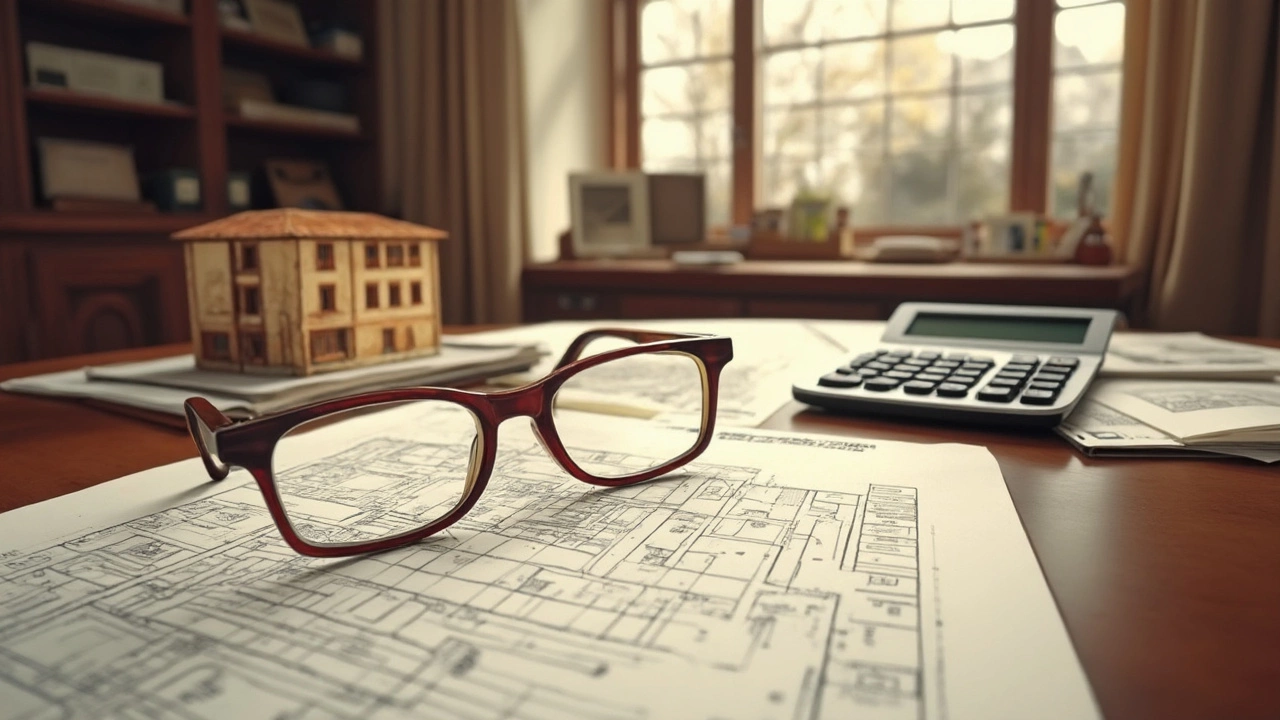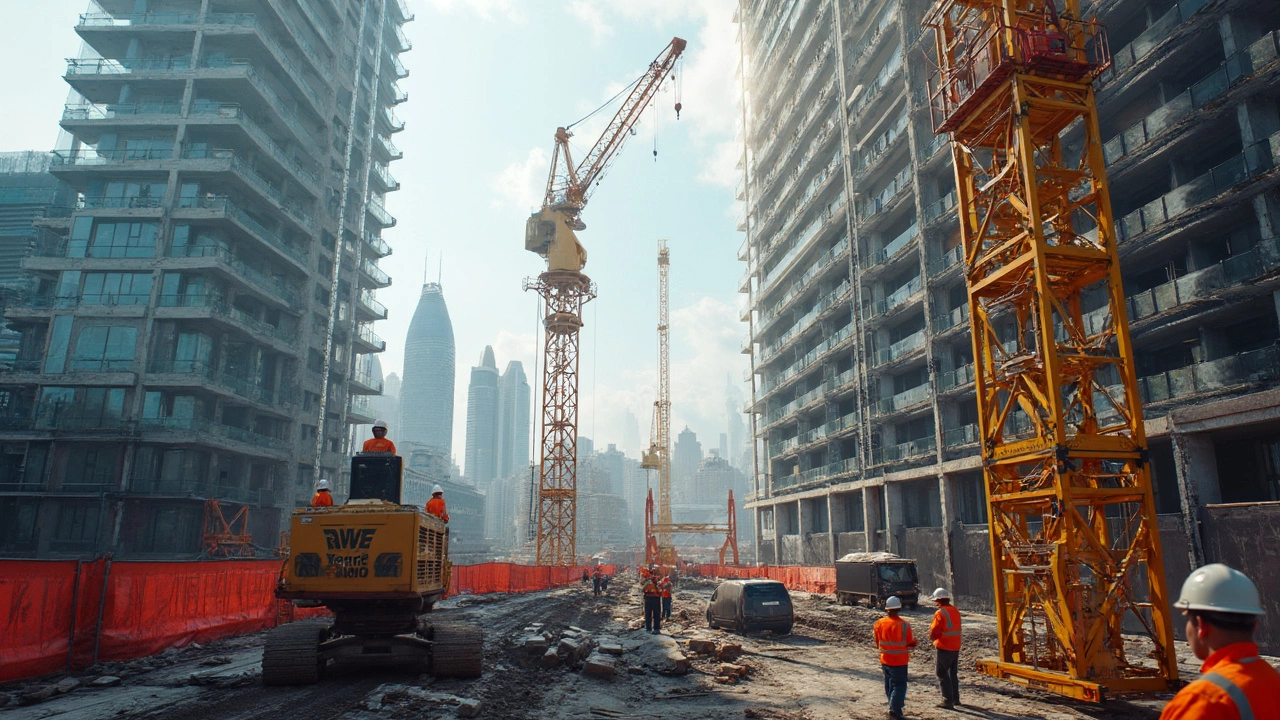Picture this: You're knee-deep in a bustling construction project, buzzing with the sound of drills, and the occasional crash of heavy equipment. Suddenly, a mishap occurs. Without the right insurance coverage, you're staring at a setback that could cost more than expected. That's why understanding what is covered under commercial construction insurance isn't just a smart move; it's crucial.
So, what's in the mix? Commercial construction coverage is like a safety net, designed to protect against possible mishaps and keep projects on track. It makes sure things like property damage, third-party liabilities, and even injuries on the site don't turn into financial hurricanes.
- Understanding Commercial Construction Coverage
- Essential Insurance Policies
- Common Exclusions in Policies
- Navigating Risk Management
- Working with Insurers and Brokers
- Tips for Comprehensive Coverage
Understanding Commercial Construction Coverage
Diving into the nitty-gritty of commercial construction coverage, it’s all about safeguarding your project from unexpected hiccups that could lead to financial woes. So, what does a typical policy include? Essentially, it's your shield against costs arising from property damage, liability claims, and even some legal messes. Let's break it down.
Firstly, property damage coverage protects the physical structures that make up your project, including the buildings under construction and materials on-site. If a storm decides to rain on your parade or a fire breaks out, this coverage has you covered.
Next, there's liability coverage. This part takes care of incidents involving third-party injuries or property damage. Picture this: a gust of wind topples materials off your site, damaging a parked car. Liability coverage steps in to handle claims, so you're not digging into your own pocket.
One can't forget builders' risk insurance, which is like a specialized policy for commercial construction projects. It’s temporary, usually covering the project only during construction, safeguarding against losses like theft or vandalism.
Another crucial piece is workers’ compensation insurance. Given the nature of construction work, accidents can happen. If a worker gets injured on site, this coverage ensures medical bills and lost wages don’t come out of your company's funds.
And yes, errors and omissions (E&O) insurance can also be vital. Sometimes, it's not physical damage but an oversight or mistake in project planning or execution that causes loss. E&O steps in here, covering legal fees or damages due to professional mistakes.
Here's a handy list of typical coverage benefits:
- Property Damage
- Liability Claims for Third-Party Injuries
- Builders’ Risk Insurance
- Workers’ Compensation
- Errors and Omissions Insurance
Understanding these facets helps keep your project safe and sound, letting you focus on building, rather than worrying about potential financial fallout.
Essential Insurance Policies
Diving into the world of commercial construction, there's a lineup of insurance policies that are basically your best friends. These policies act like guardrails, ready to step in when things start sliding downhill.
First up, you've got the Commercial General Liability (CGL) insurance. This one is a must-have. It covers third-party claims for bodily injury or property damage. Imagine if a loose nail sends someone to the hospital or a falling hammer dents a parked car. CGL has got your back (well, your wallet).
Next, there's Builder's Risk Insurance. This policy covers you during the construction phase. It usually takes care of damage to buildings under construction. So, if a storm decides to throw a curveball, you won't be left out in the rain financially.
Workers' Compensation Insurance is also crucial. It's all about taking care of your crew. If anyone gets injured on the job, this policy ensures they're covered for medical expenses and lost wages. Nobody plans for accidents, but it's smart to be prepared.
Then there's Professional Liability Insurance, or as some call it, Errors and Omissions Insurance. This is for when the blueprints don’t quite match up with the reality due to design mistakes. It covers negligence claims that arise from errors made during the planning stages.
Finally, consider having Pollution Liability Insurance. It's often overlooked, but if your project involves potential contamination or pollution risks, this coverage shields you from associated cleanup and damage costs.
- Commercial General Liability Insurance
- Builder's Risk Insurance
- Workers' Compensation Insurance
- Professional Liability Insurance
- Pollution Liability Insurance
Think of these policies as your personal team of superheroes, each stepping in to tackle different kinds of crises. Securing these insurances is like wearing a seatbelt on a bumpy road—better safe than sorry, right?
Common Exclusions in Policies
When diving into the nitty-gritty of commercial construction insurance, it's not all sunny skies and rainbows. There are some spots—rough patches if you will—that policies simply won't cover. These exclusions can be dealbreakers if you're not aware, so let's break down some of the usual suspects.
One of the big ones? Wear and tear. Insurance companies often draw the line at covering damages resulting from normal aging and deterioration of materials. It sounds obvious, but imagine discovering rust issues on metal structures that aren't covered—it’s a headache waiting to happen.
Next up, faulty workmanship. If something’s built wrong, your insurer might take a step back. This exclusion is all about protecting them from covering mistakes that proper techniques and systems should’ve caught in the first place.
Then there’s a lack of maintenance. If issues arise because standards in upkeep aren’t met, insurers will steer clear. It's like if you never change your car’s oil and the engine breaks down. That one’s on you, pal.
The Insurance Information Institute notes, "Policyholders should be clear on their policy’s limitations. Understanding exclusions is as critical as knowing what's covered.”
Natural disasters, such as floods or earthquakes, might also not make the cut in a standard policy. Depending on where you are, these might require special coverage. It’s kind of like extra features on a phone plan—you’ve got to ask for them.
And don’t forget about criminal activities. Damages caused by intentional acts won’t be covered. If someone purposely damages your site, that’s a legal issue, not an insurance one.
So, remember, knowing these hiccups can save a ton of grief. Always read the fine print or consult with an insurance expert who can guide you through the stuff you didn’t study in school.

Navigating Risk Management
In the world of commercial construction, managing risk efficiently is like steering a ship through choppy waters—crucial to reaching your destination unscathed. So, how do you keep everything on an even keel?
First, you need to thoroughly analyze all the potential risks before they morph into bigger issues. Basically, think about what could go wrong—anything from project delays and cost overruns to safety concerns and natural disasters. Identifying these factors early is half the battle won.
Once you've got a handle on the possible risks, it's time to strategize. This usually involves setting up a robust system for regular inspections and maintenance schedules. Keeping things in check is key to avoiding nasty surprises. Plus, involving every team member in this process ensures everyone is aware and prepared.
An important aspect of risk management is having the right insurance coverage. From builders' risk insurance to liability coverage, ensuring you're adequately insured can be the difference between a small hiccup and a financial catastrophe.
Also, don't underestimate the value of seasoned risk managers. Their experience and knowledge about what can go wrong—and how to prepare for it—are invaluable. Hire someone who knows their stuff.
Last but not least, fostering good communication among everyone involved, be it subcontractors or the core team members, ensures that risks are communicated promptly. No one likes surprises in construction. Keep everyone in the loop, and you’ll have fewer fires to put out.
Working with Insurers and Brokers
When you're diving into the world of commercial construction, teaming up with the right insurers and brokers is like having a GPS for navigating the rocky terrains of insurance policies. Let's break down how to make this partnership work for you.
First things first, choosing the right broker can make a massive difference. These professionals act like your go-to guides, helping you find insurance that fits your project's unique needs. Look for brokers who specialize in construction policies because they're likely to be more familiar with the typical risks and potential pitfalls in your industry.
Once you've got your broker, transparency is key. Give them a full view of your project, from start dates to any pre-existing risks. The more they know, the better they can tailor your coverage.
- Be clear about budget constraints; insurance isn't a one-size-fits-all deal.
- Ask questions about claim processes, expected response times, and policy flexibility.
- Discuss potential exclusions upfront so there are no surprises later.
Brokers can also help you play the field. They'll gather quotes from multiple insurers, giving you a clearer picture of what's available. Don’t shy away from asking why one policy is pricier than another; sometimes, more expensive policies offer crucial benefits like faster claim settlements or better customer service.
Another insider tip? Build a relationship with your insurer. Having a reliable point of contact, someone who understands your business, can save you hassle in the long run. If things go south, you're not just another name on a policy; they'll know your story and be ready to help you sort it out.
To wrap up, think of your brokers and insurers as essential team members of your construction project. With knowledgeable partners by your side, navigating the complexities of insurance coverage becomes a whole lot easier. Equip yourself with these insights, and keep those unexpected financial setbacks firmly in check!
Tips for Comprehensive Coverage
When dealing with commercial construction, having the right coverage is like having a well-oiled machine. It keeps everything running smoothly and protects your investment from unexpected hiccups. So, how do you ensure your coverage is rock-solid? Here are some tips to help you out.
First off, conduct a thorough risk assessment. Know what you're up against in terms of potential threats and incidents. This knowledge helps in customizing your insurance policies to match the specific needs of your project. Common risks include property damage, injuries, and even environmental hazards.
- Make sure to include Builder's Risk Insurance: This is vital as it covers things like fire, theft, and vandalism while the project is still under construction. Don't start without it!
- Get General Liability Insurance: This takes care of third-party claims. Imagine something from your site causing damage to another property or harming someone. You don't want to be footing that bill.
- Consider Professional Liability Insurance: If your project involves design or engineering services, this will cover you against claims of negligence or errors in your plans.
Another clever move is working closely with insurers and brokers. They know the ins and outs of the game and help you navigate the complex insurance landscape. A broker can provide you with options you might not have considered.
Finally, regularly review your coverage. Construction projects evolve, and so do risks. Set a reminder to reassess your policies every few months. If you've added new aspects to the project, like renting specialized equipment, you might need to update your coverage.
Taking these proactive steps ensures your commercial construction project is sheltered from financial storms. Consider these tips for a worry-free build!
